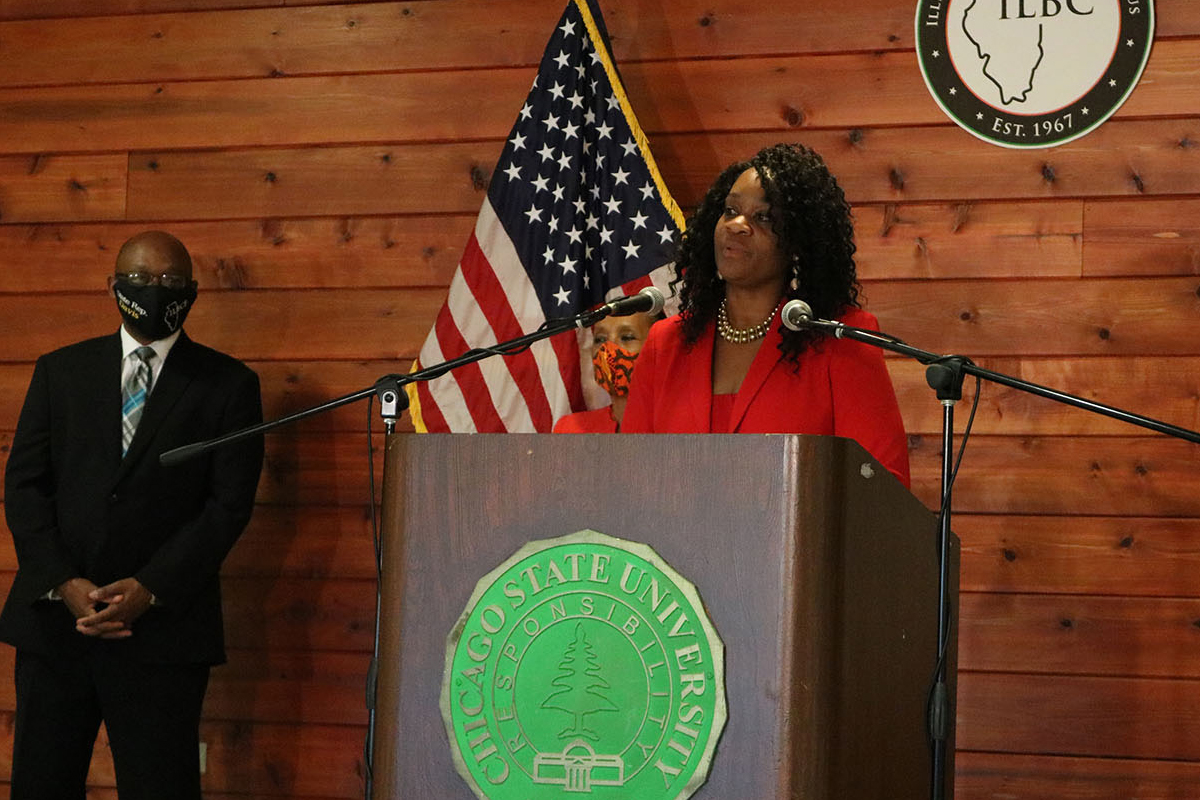
CHICAGO — The Illinois Legislative Black Caucus called for equitable resources for Black students who have been historically marginalized and underserved in a press conference on Wednesday at Chicago State University, prior to a scheduled Senate committee hearing on the matter.
The Black Caucus discussed their efforts to develop an agenda to overcome racial disparities in early childhood education, K-12 education, higher education and workforce training.
ILBC Chairman Kimberly A. Lightford (D-Maywood) said Black students deserve to have the same quality of education as students of any other race in the state.
“For far too long, Black students’ academic performance has suffered and their upward trajectory has been stifled by a severe lack of resources,” Lightford said. “We must ensure that schools in Black communities receive adequate funding to set our students on a path toward success at an early age. A quality education should not be out of reach for Black students because of where they live or their family’s financial situation. We seek to identify and eliminate every systemic barrier preventing educational achievement and career advancement.”
Education is the second of four major policy pillars the Black Caucus is focusing on to develop their legislative agenda. They include:
- Criminal justice reform, violence reduction and police accountability
- Education and workforce development
- Economic access, equity and opportunity
- Health care and human services
State Representative Carol Ammons (D-Urbana) is the chair of the House Higher Education Committee. She stated the need to ensure Black students are exposed to various professions and a more inclusive curriculum.
"The single most important component to social justice and the Black Caucus agenda is education. Without education, our work loses purpose and context,” Ammons said. “To fight this fight, we need to reimagine what education looks like. We must stop whitewashing history, we must encourage young women to pursue STEM, and we must trust our younger generation to see the world as it is, and fight for a better world. We need curriculum reform that values the contributions of Black people in every academic subject across the board."
Illinois House Assistant Majority Leader Rep. Will Davis (D-Hazel Crest) is a member of the House Appropriations-Elementary and Secondary Education Committee. He spearheaded efforts in the House to pass education funding reform legislation.
“The importance of adequate educational resources cannot be overstated and historically school systems within Black communities have been underfunded and under resourced,” said Davis. “When we talk about racial equality and social justice, it starts with education. Access to a quality education shouldn’t be a marker of social class or economic status, nor should it be a reflection of a child’s zip code because everyone deserves to be properly educated from the earliest moments of life and learning.”
State Senator Jacqueline Collins (D-Chicago) said students should learn more about the African American experience in school.
"Black history is American history and the racial reckoning confronting and challenging America today is the result of America’s refusal to recognize that fact," Collins said. "The Black experience is part of the American experience, the human experience, and our nation’s rich and complicated history and should not be taught in a vacuum."
State Representative Nicholas K. Smith (D-Chicago) is a member of committees focused on higher education and early childhood education.
"Illinois needs to prioritize closing the education gap for all children, especially our kids of color who are disproportionately at risk of being left behind,” said Smith. “Education is one of the most effective tools to combat poverty and the lack of opportunity. The quicker we identify our obstacles and overcome them, the sooner we can change the course of history and become a leader in the nation for all states to look up to.”
“Inaction is not an option,” said Smith. “If we want our children to grow up to be self-sufficient then we have to invest in them on the front end, regardless of zip code or skin tone. The importance of appropriate funding for early childhood education is obvious and shouldn’t be a controversial opinion. Access to early literacy programs isn’t a political issue; it’s a plan for the future."
The caucus plans to have a series of hearings for each pillar. Two hearings have already been held for the first pillar. A virtual joint hearing on education and higher education will follow the press conference at noon on Wednesday. It will focus specifically on early childhood education and can be viewed here: https://ilga.gov/senateaudvid.asp#. Blue Room Stream, a subscription-based service, will also stream the hearing.













 © 2026 Illinois Senate Democratic Caucus
© 2026 Illinois Senate Democratic Caucus